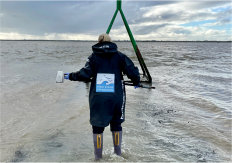 Researchers testing water quality in and around the harbours say a worrying number of chemicals have been identified, including prescribed and illegal drugs.
Researchers testing water quality in and around the harbours say a worrying number of chemicals have been identified, including prescribed and illegal drugs.
An ongoing study looking at water quality in and around Chichester and Langstone harbours has revealed high levels of potentially harmful chemicals.
In a novel collaboration between local interest groups and Portsmouth and Brunel Universities, hundreds of samples were gathered by the Clean Harbours Partnership (CHP) campaign group last year as part of Project Spotlight.
University of Portsmouth and Brunel University London researchers analysed 288 samples and have so far detected more than 50 compounds across 22 sites.
 Professor Alex Ford from the University of Portsmouth’s Institute for Marine Sciences © University of Portsmouth said,
Professor Alex Ford from the University of Portsmouth’s Institute for Marine Sciences © University of Portsmouth said,
“This project is enabling us to determine what chemical contaminants are in our marine life and coastal waters.
“We have found a large variety of prescribed and illegal drugs plus a variety of pesticides in coastal waters and marine organisms, such as crabs and oysters.
“This is important, because we know that aquatic ecosystems are under threat from pharmaceuticals and farming practices such as biocides and fertilisers.”
Professor Ford’s previous research revealed tiny quantities of antidepressants in water can affect wildlife, such as crustaceans and molluscs. Levels above 500cfu/100ml signify a risk to human health.
Scientists will now compare the concentrations of these pollutants, found during last year's drought, to those taken at the same sewage discharge locations after combined sewer overflow (CSOs) discharges had been activated by rainfall.
“Chemical pollution from CSOs is becoming a real cause for concern due to the number of chemicals that are being found all over the environment and not just in the UK,” explained Dr Tom Miller from Brunel University.
“It is important that the public are becoming more aware of the problem, and it has been a really great opportunity to work with locals in the area and address some of their concerns surrounding the issue.”
Project Spotlight was funded by concerned local residents, groups of water-users and organisations through the Clean Harbours Partnership.
 “This project is enabling us to determine what chemical contaminants are in our marine life and coastal waters.
“This project is enabling us to determine what chemical contaminants are in our marine life and coastal waters.
“We have found a large variety of prescribed and illegal drugs plus a variety of pesticides in coastal waters and marine organisms, such as crabs and oysters.”